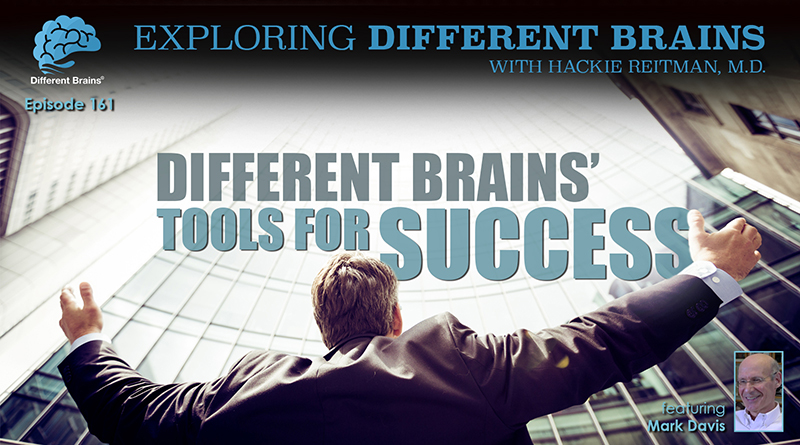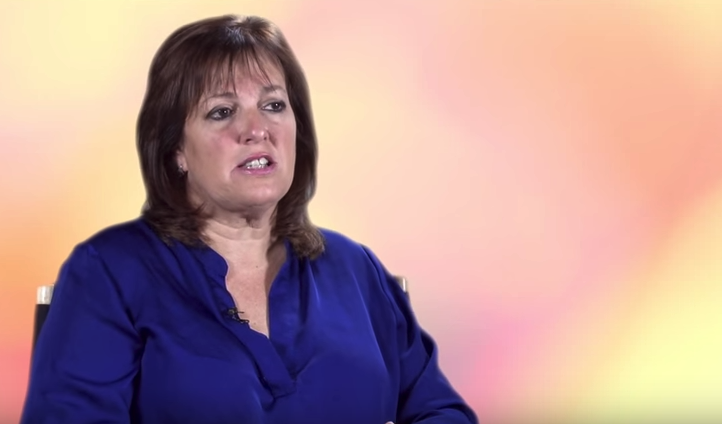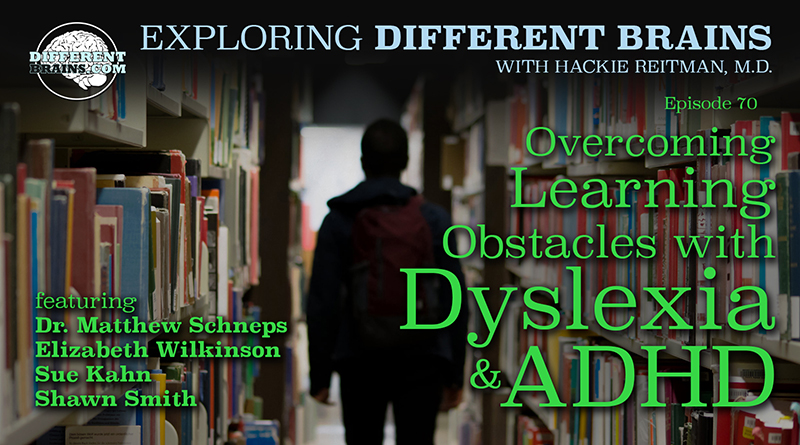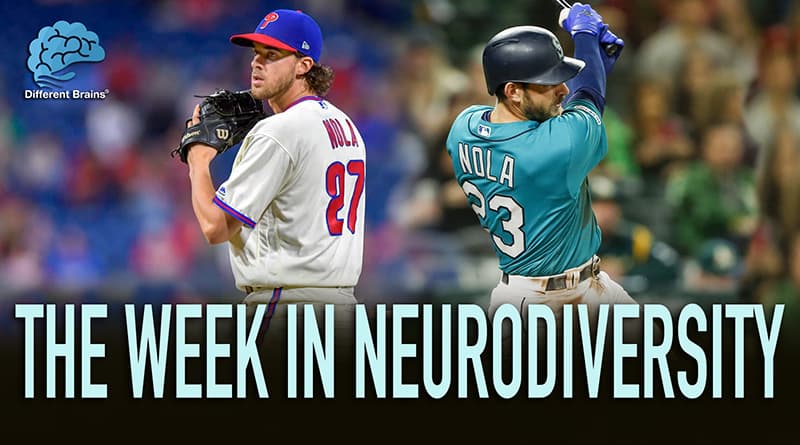
Different Brains’ Tools For Success, with Mark Davis | EDB 161
In this episode, Dr. Hackie Reitman speaks with entrepreneur Mark Davis. The two discuss Mark’s keys to success, and cover tools for accomplishing tasks and maximizing potential. (25 minutes)
To listen or download the podcast version of this episode, see the embedded player below.
Or look for us on your favorite podcast provider:
iTunes | Stitcher | SoundCloud
TRANSCRIPTION
[expand title=”View Full Transcript”]HACKIE REITMAN, M.D. (HR): Hi I’m Dr. Hackie Reitman! Welcome to another episode of Exploring Different Brains, and today we’re lucky to have my friend, Mark Davis, all the way from Aspen, Colorado to come and tell us about his brain. You’re going to see what I mean in a little bit. Mark, welcome.
MARK DAVIS (MD): Pleasure to be here.
HR: Some people who are gonna be wondering why you’re on Different Brains, but I’m going to tell ’em in a minute. But Mark, you’re an entrepreneur, you’re an attorney, you’re a philanthropist, you’re a lot of things. Introduce yourself to our audience so they know what you’re about.
MD: What I’m about, it’s an interesting question. I would say that I attended a show with my daughter once that before you sat down, pick from a board of maybe five hundred different things that define you, and I looked. I was a lawyer, I was an entrepreneur, I was a real estate developer, but the one car that I picked was father, And I think that’s how I like to be defined in simplicity.
Fatherhood
HR: Well, tell us about your fatherhood.
MD: Well, I’ve been married twice, my first wife, I’m lucky to have two daughters. Second wife who we’ve been married now for 35 years. Have two more daughters, so I’m been blessed with four girls, and have lived all my life among nothing but women. So it teaches you a lot of patience to understand different brains ’cause we were exposed to them, to understand different languages because my wife is also from Puerto Rico, so the primary language that was spoken in our home is Spanish. I’ve loved being a father, although, the first time I think I was the one who needed the hospital bed instead of my wife when my first daughter was born, and it comes as part, I guess, my desire to be a teacher, As I’ve gotten older, hopefully gotten a little wiser, being able to share my experience and whatever wisdom I’ve been able to collect over the years, with my children.
Succeeding with tasks
HR: One other thing that impresses me and one of the reasons I’ve wanted you to share your knowledge and your habits with our Different Brains audience was your very methodical and systematic way of going about things. You know around here our interns can tell you that I’ll often say “hackie’s rule of 3” and these ways we have kind of simplifying things to get them done. But I notice in all of work you do That you have a very systematic approach. So, I was hoping maybe today you could break that down a little bit to share with our audience. When you have a task to do, how does it go?
MD: Well, my training as a lawyer I think has been very helpful to me. The one thing if I’m asked what is it that you really learned in law school, It’s to learn how to think in a very organized and methodical way. It’s also to find the support for whatever it is, talking about empirical evidence in the case of being of the law, it’s finding case law or statutes or regulations or whatever that support what it is that you’re seeking to accomplish, and also don’t support because you need to understand both sides of any argument. That’s one of the best things that I feel law school prepared me for. As I told a story earlier a professor of mine, when I was a freshmen in college, who I became very friendly with, was the one who told me he thought that I was born to be a lawyer. It was never in my thinking, I never have been exposed to lawyers, other than watching Perry Mason “I’m Dating Myself Right Now” Which was an old television show with a lawyer who always found the way to break a person who was lying on the stand, but other than that, no exposure to the law or lawyers and but I took to the law immediately again, its a very methodical – understand the problem, understand all of the evidence, if you will, that you need to gather in order to determine exactly what the scope of the problem is, what it is that you want to accomplish, and then marshall all of the assets that you have towards that goal.
I am also extremely disciplined; I guess the best example I give, when I was in law school, there’s something called the Law Review, which is a very interesting fact that not many people know, that but all of the major publications in the legal field are actually edited by students, and every law school has their own Law Review. One of the requirements for someone who was put on the Law Review, which I was after my freshmen year in law school, was to write two articles for potential publication, and so, the first one that I write – people usually take weeks and weeks and weeks, to do all of the research, which I did. It took a long time to do the research, but when it came to doing the writing, I started and didn’t finish until 48 hours later and the whole thing was written in those 48 hours. It annoyed me to have to take a bathroom break because when I got into that zone, It was just nothing penetrated other than getting that job completed. And often times when I’m writing, when is either E-mails or whatever it is that I’m writing, I will rewrite things fifty or a hundred times and sometimes I’m ready to send that document, or send that E-mail. I know that their was a coma missing, and I won’t send it. I go back and re-edit again. To me, I have to feel that I had done the very best I could possibly do before I release anything. And I don’t know, sometimes I think I have a certain degree of Obsessive-Compulsive Disorder (OCD)-
HR: Oh you do! You are OCD, and I think your wife Yoli Davis can attest to that, yes.
MD: (CHUCKLES) But that can be a very positive thing, and it certainly in my life, it has been a very positive thing.
HR: Well, certainly in your different careers of law, of real estate development, and investments, and all that you do in your philanthropy and everything. You don’t let things overwhelm you, you stick to your system. And I’ve observed this when we’re being a house guest out in Aspen, Colorado, and you’re working away,burning the midnight oil, and you’re just getting it all done.
MD: Yeah, I’ve been blessed, a lot of people get stressed. I guess we all have stress to a certain degree. But, I’ve never felt to be a person who suffered from stress. Um I have a very calm demeanor; it’s hard to get me angry. When I do get angry, its not a pretty thing to see. But its very rare. I let things go that I think that would bother a lot of people. In many respects, that may have been a problem in my first marriage, quite frankly, as that I was not willing to really tell my first wife exactly how I felt and the things that were bothering me. And in retrospect that was probably a mistake, because I try to avoid confrontations.
Principles
HR: Now in your business dealings, and also in a lot of the work that you’re doing and everything, you told me that you were profoundly influenced by the book, “Principles” by Ray Dallier.
MD: Well, part of it is – are things that I have always done in my life. Because one point that Dallier makes is the importance of seeking out expertise. In whatever it is that – because nobody knows everything. No matter how smart you are, you clearly can’t know everything, and moreover each of us has blind spots; the hardest person to know is yourself. Ego gets in the way, it doesn’t allow things to penetrate – lessons to be learned, that because our ego blocks it and even if our ego wasn’t blocking it we just – it’s just very hard for someone to understand themselves, and all of the motivating factors that happen so one of the points that Dallier makes is always seek all of the possible information and rely on those people who have the most credibility in the field, that you need that information for, and don’t let your ego get in the way. Those are things that I’ve always believed in; some of the things that Dallier does, that I found particularly interesting, because it’s not consistent with who I have been through my life, is he believes in what he calls ‘radical honesty’ and ‘radical transparency’, and that is that, in a non-insulting way, he just believes that you need to tell people how exactly you feel and be willing to to talk to them about their short-comings and their failings and do so in an honest way because to do anything other than that, is really to do a disservice to the people that you’re working with.
Although it’s a very difficult thing because it’s hard to tell somebody that they’re doing things wrong or are doing a lousy job on something but he strongly believes in that, and that’s something I’ve actually tried to work on. It is to be more will- as I had mentioned earlier, I’ve not been a person during my life that’s sought out confrontations, I shy away from confrontations, there’s a whole history which I’m happy to share if you’re interested, and how I believe I got there from my own experience but nevertheless it’s been something that has always bothered me, and I wanted to be more assertive, and just listening to Dallier and the logical arguments step by step as you say that he makes, and he goes on at nauseum, in terms of detail by detail and the reasons why things should be done this way.
Assertiveness
HR: Let’s take this one tool, because like when I wrote the book “Aspertools” were very into schools can help so give us the tool to be appropriately assertive. Let me put it like that.
MD: For me the tool is to recognize that you are doing a favor to someone by telling them the truth and sometimes that can be painful, but it’s better for someone to feel that pain and get a dose of true reality, then to live in a fantasy world that’s only going to hurt them in the long run. So recognizing the logical wisdom of that position has helped me become more assertive, and fight my wiring or my years of bad habits. To do that, but to try to do it in a positive way, not to be hurtful, that’s not the goal. The goal is to get to the truth, whatever the truth is. And Dallier goes on in a very systematic way to actually rate people, put them through batteries of all sorts of tests, to try to understand where their blind spots are and where are their strengths and weaknesses are, then he tries to match up people’s objective strengths and weaknesses with the job that they have.
HR: And I think a corollary to that also, is that if you were a leader of say, an organization or a business or a club, whatever, is to foster a culture where it’s okay to disagree. We want people to disagree if we have the better idea it’s good let’s get it out there; not in a nasty way or anything like that, but we do try especially around here, we got a lot of different brains around here, and I don’t know how I would have been labeled I got expelled in the 1st grade and the 10th grade and everything. But we’re open to different ideas and you have to have a culture where the best ideas get to the top, doesn’t matter who said it.
MD: That is Dallier. He calls it the “Idea Meritocracy’ and that’s all he’s interested in, he doesn’t care who gets the credit, he doesn’t care if it’s not his idea, he wants the best possible idea in search for, not that you can never really probably find it, but as close as possible to ultimate truth. Very interesting I had listened to lectures all the time in the morning when I walk, today I’m listening to of all things the dialogues of Plato, and when you – listening to that lecture was probably one of the best lectures I’ve ever heard, but he talks about Socrates, and Socrates’ whole mission was to get to ultimate truth, and he did it through conversations that’s the only way you can test it, Dallier does the same thing. I hadn’t made that connection until right now, but Dallier was the new Socrates.
Mark’s daughter Nicole
HR: Back when Socrates was around they didn’t ever have a printing press either! Tell us about your daughter, Nicole, who’s now on a broadway play and her journey and some of the things she had to overcome to get where she is.
MD: Yeah, very interesting, Nicole… Nicole was always a very smart child, and she also likes singing. So she was in a choral group in high school, etc. Actually I was with at Carnegie Hall with her choral group when we lived in Florida that was at the Pine Crest School, but had never shown an interest in acting, and in her senior year of high school, she came home one night and said she’s going to try out for the school play. The play happened to be “The Sound of Music”, so it surprised my wife and I because she had never before expressed any interest in doing that and two weeks later she comes home and said that she’s been cast as the lead so she became Maria in The Sound of Music, and we knew that she had a nice voice so I guess the singing part didn’t surprise us, but the acting part was something that did surprise us so she went and my wife whose name is Jolee, and she went a few times to help Nicole get dressed, and she kept coming home to me and says “Mark, you’re not going to believe this, but Nicole is really terrific in this role.” So we went to the performance, actually to each of the performances, and both my wife and I were flabbergasted as to how this, how old had she of been, seventeen year old kid became a mother on stage, and she – it was really an overwhelming experience to be able to see that and we said, “wow, that she really has talented, and everyone is saying that she was very talented, etc.” and, I’ll never forget the local paper, I couldn’t read the true local paper because it was in Spanish – that’s one of my blind spots, is I’ve never been able to speak Spanish but they did have an English language paper who did a review of this play, and in it, it said that Nicole Davis had great talent and we’re going to see this young lady on Broadway one day. And anyway, she went on to college and she again didn’t pursue the acting part; she went to a university that really didn’t have an acting program- it had a theater program, but that was mostly the academic side of theater and she waffled in terms of she wanted to do she was a good student, she had interest in chemistry, she pursued that and didn’t like that; and ultimately gravitated to theater and became a theater major, and was in a school play, but again hadn’t really expressed any interest.
And then, I think it was the summer after she graduated college, she went into an acting program in New York and for the first time, she really fell in love with acting, where it became – not something that she was doing just to do it it was became a calling, a true passion, and we encouraged that. So she continued to do it, she acted in a couple of things that always amazed me and my wife how quickly she could memorize all of her lines, and when I asked her a million times, she would say, “that’s the easiest part of acting.” Shocks me. But she then went on to Brown University in a master’s degree where she spent three years really learning how to to act and it just bubbles up within her and it’s a passion, it’s such a beautiful thing to say is I’ve said actually not long ago, but many times, there are so few people in this world who actually really do in life what they love. We’re all stuck in doing things that to make a dollar to make a living whatever but most people really don’t love what they do and to be able to see someone like Nicole who really loves what she does is a true joy and there’s – so her journey was – wasn’t an easy straight line, but her talent has made it easier. Most people get rejected, and Nicole has had her share of rejection, but for someone so young in her career to be on Broadway already, and she has a role in a play called “Network” with Bryan Cranston and Tony Goldwyn which in and of itself is great but she was also in addition to her nightly role she is also the understudy to the lead actress, who I shouldn’t say this but thankfully got sick, and Nicole was able to step into the lead for five performances, we saw as many of those as we could get to see because we didn’t even know we were in Miami and she was in New York and we didn’t even know that she was going to go on until virtually three hours before she had to do it. That to me may be the most staggering thing of all, I mean imagine getting three hours notice of having to step into the lead role in a Broadway play without having done it before, an overwhelming experience and but she just loves it she’s very good at it and she’s going places. Even though she’s my daughter.
HR: She’s going to be a big star, and it’ll be a great piece of trivia I’ll always have that she had a small part in our movie “the square root of 2”, starring Darby Stanfield from Scandal and what a coincidence that now she’s on Broadway and Tony Goldwyn is in it too, along with Bryan Cranston and she’s going to be a big star, a big star.
MD: We think so, and so do the fellow actors who we got the meet and spend some time with Tony Goldwyn as well.
Final advice
HR: What is the biggest piece of advice you would have for somebody who’s getting overwhelmed with too many tasks and they can’t seem to get things organized, and each day goes on and they think this is the day that I’ll get over the hump, and they don’t, and at end of the day they still have million flagged emails and a bunch in their project list that’s in disorder what’s your recommendation?
MD: Well I’ll tell you what works for me. I very regularly make my to do lists and try to list them in relative levels of importance of what needs to get done by when, and then I get started on something and I will not stop till it’s finished, and then you move on to the next thing, and you will find at least I have found that that is the way out, the problem is when you have the sense of being overwhelmed, it’s to get a sense of what you really have to get done and making those to do lists and then following them. In order has always worked for me,it eliminates that sense of being overwhelmed I know exactly what I need to do and which ones I need to do first, the other thing is don’t touch a piece of paper more than once. If an email comes in and it requires an action, don’t let it get buried in your inbox: address it, deal with it, erase it and move on, and when you allow things to pile up, it can also give you the sense
of being overwhelmed. Sometimes I’ve had to work as I did in law school, 24 hours work till four, five, six o’ clock in the morning. But that sense of having accomplished that whatever it was that I needed to get done is at least for me, something that brings me a lot of pleasure. Not a lot of sleep but a lot of pleasure.
HR: (CHUCKLES) Well, on that sleepless note, we’re going to thank you for being here today, Mark, it was great. Hope to have you back again, and thanks so much and we hope that Nicole goes on to bigger and better things and I’m sure, based on everything we see now, she’s going to be a big star.
MD: That’s the one thing I’m most confident of. Thank you
[/expand]



